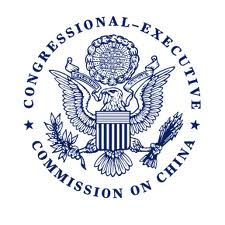The U.S. Congressional-Executive Commission on China issued its annual report on human rights and rule of law on Thursday (PDF). The authors state that “conditions in China overall did not improve this past year, and declined in some of the areas covered,” warning that negative trends seem set to continue under Xi Jinping’s rule. From the report’s introduction:
Nearly 2 years into what likely will be a 10-year tenure, President and Party General Secretary Xi Jinping has already left his mark on the nation. His priorities have included introducing the notion of the “Chinese dream” to spur a “great rejuvenation of the Chinese nation” and launching a campaign against corruption that has swept up some of China’s highest officials. His administration faces major challenges: a slowing economy, income inequality, ethnic tensions, severe pollution, and food safety problems. As this report shows, however, Xi and his administration continue to adhere to the authoritarian model of his predecessors, one whose core tenets are unchallenged leadership of the Party and extensive efforts to suppress perceived threats to the Party. Under this model, which Party leaders assert guarantees “social stability” and a “harmonious society,” China’s 1.4 billion citizens cannot participate freely in policymaking or governance. They do not possess a meaningful right to vote. They do not enjoy the basic freedoms of expression, religion, and association provided in China’s Constitution. The Chinese government refers deferentially to the concept of rule of law. In practice, however, it routinely ignores or manipulates domestic and international laws for political purposes or to advance China’s economic interests.
[…] Providing citizens with more avenues for justice and greater freedoms will help China address corruption, labor unrest, ethnic tensions, and food safety. It will increase stability and improve China’s standing worldwide. This future is possible, however, only if China’s leaders move in a new direction and begin to view human rights and the rule of law as essential components of, rather than as impediments to, economic and social progress. [Source]
China Law & Policy’s Elizabeth Lynch highlighted issues on China’s periphery, “both from a geographic as well as a societal perspective”:
The Chinese government’s reaction to the Hong Kong protests earlier this month – calling the peaceful protesters “extreme” and threatening “unimaginable consequences” – pale in comparison to its suppression of any attempts in Tibet or Xinjiang to give life to the term “autonomous” in the title Autonomous Region which both nominally are. In the past year alone, of the 141 Chinese political prisoners that China has arrested or detained […], 101 are Tibetan or Uigher (the ethnic group that populates Xinjiang […] in western China).
[… A]s the CECC’s Annual Report illustrates, controlling the periphery increasingly means controlling entities ostensibly outside of its borders. The Chinese government’s continued use of the journalist visa process in an attempt to censor foreign coverage of China is one such example. The other, is the lopsided use of its laws to benefit domestic businesses over foreign ones, in particular the anti-monopoly law. As Sophie Richardson, Human Rights Watch’s China Director points out, rule of law issues in China are no longer a fringe human rights issue; instead, the same arbitrary legal system that puts dissidents in jail for life is now beginning to negatively impact foreign business interests in China. But will this Annual Report will be the wake-up call to business and the U.S. government that it needs to actually start considering attention these issues? That it needs to actually read the CECC’s Annual Report, not just mandate that it be created? [Source]
Read more on Hong Kong, Tibet, and Xinjiang, on journalists’ visas and anti-monopoly cases, and on human rights and rule of law across China, via CDT.







